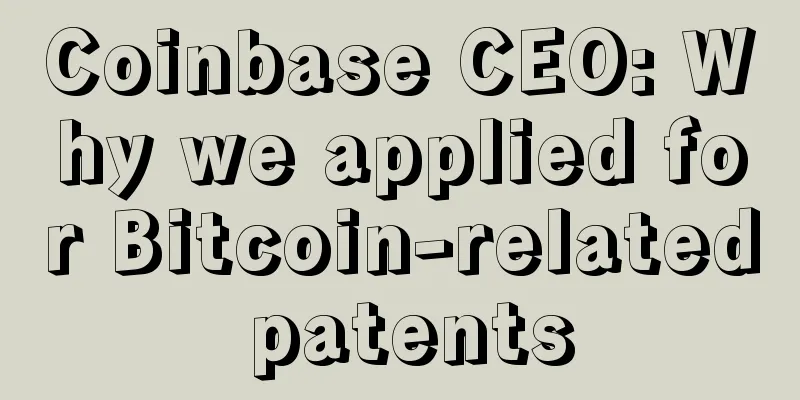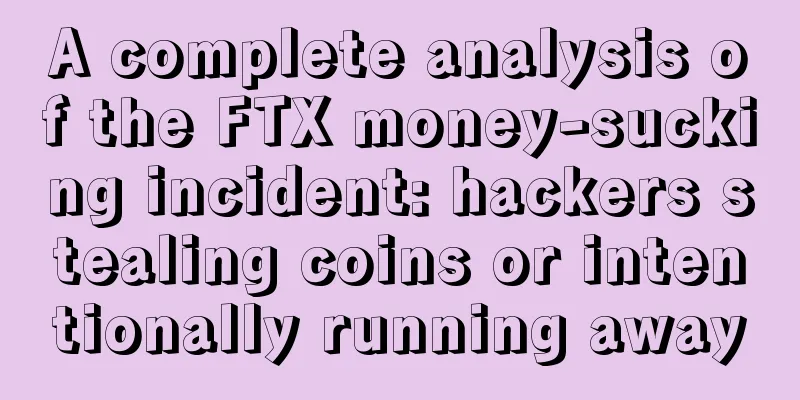Coinbase CEO: Why we applied for Bitcoin-related patents

|
Editor's note: The original author Brian Armstrong is the CEO of Bitcoin company Coinbase. Armstrong himself has something to say about the recent controversy over "Coinbase's patent application." There have been several articles in the past week commenting on Coinbase's application for a Bitcoin patent. I wanted to provide some context that may help you understand the patent application. I personally would prefer a world where all software patents didn't exist (I think they hurt innovation and waste a lot of time and money), but since they do exist, we have to take it seriously. In the business world, patents are a boon, but such a world is dangerous. Our ultimate goal is to obtain Bitcoin-related patents and keep them out of the hands of the bad guys. We hope to use them to protect Coinbase from the threat of patent trolls and help the Bitcoin ecosystem continue to grow. If you are not in favor of the patent system, why do you still apply for patents?Given Coinbase’s growth, this may not matter, but when we try to raise hundreds of millions of dollars, these patent trolls will smell it. In fact, we’ve already seen one. One of the best ways to prevent these patent trolls is to build your own patent portfolio. It’s an unfortunate game, but we have to play it, and we didn’t invent the rules. (If you can forgive that, don’t blame the players, blame the game as a whole.) If you are running a tech company and you don't apply for patents at some point, I would think you are doing it wrong. The question now is what do you do with those patents if they are granted (more on that below). The Bitcoin community was built on the ideals of openness and decentralization, so software patents are particularly bad in our industry. However, this does not stop other large companies from pursuing Bitcoin patents and using them offensively. By refusing to apply for Bitcoin patents, you are not helping Bitcoin or doing the right thing, you are just putting yourself and your company in danger. Why apply now? What is the reasoning behind it?We applied about 18 months ago and some of the articles that reported it were wrong, they didn't just happen. There is no particular urgency regarding the filing time. We applied for these patents in the normal course of business. I hope we can continue to apply for new patents every year. But your patent applications are so broad in scope, do you really think Coinbase invented these things or that they would be approved?This stems from a misunderstanding as to why companies file these patents. It serves a dual purpose. First, if the patent application is rejected, you still have a record of the technology, which can serve as useful evidence in future frivolous infringement claims. Secondly, if the patent application is accepted, you can cover as much of the technology as possible and reduce the potential threat from your opponents. From this perspective, our patent strategy may make more sense. In addition, I think something is clear: getting a patent is not only to prevent patent trolls, it also increases the value of the enterprise (for future plans, the impact of this is not very big, for example, we have never discussed our patent applications when we were raising funds before), but it is definitely a factor. Will you use these patents to drive out other Bitcoin companies? If not, how can you assure us?No, we applied for these patents without any aggressive purpose, and we have no intention to drive out any other Bitcoin companies. We applied only to prevent patent trolls and increase the value of our company. I personally think it is unethical for large companies to use patents to drive out small companies. “Committing to this” is a tricky question. First, we did sign a patent pledge, which is a good start, although my understanding is that it is not legally binding, which may not give you comfort. Next, we need to figure out how to solve this problem. To be honest, we are also educated on this. I know there are many different ways to do this, some of which I know of are:
We are considering all of the above options and haven’t finalized them yet (also, we don’t have any patents yet, we’ve just submitted applications, so we have time to figure this out), but my ideal strategy would be something that leans towards defensive and open source. Why don't you open source your patents like Tesla did?This is one of the options we are considering in the future. I am a big fan of Tesla, and we also want to adopt a similar strategy. Tesla had obtained more than 200 patents before its head Elon Musk announced that they would open source their patents (so it is obvious that Tesla is also in favor of applying for patents). Furthermore, Tesla was valued in the billions before they open-sourced their patents (similar to Google and Twitter when they made patent commitments), so this is usually something that more mature companies than Coinbase would do. So this process is still too early for us, but we generally follow similar strategies. Why didn't you coordinate and consult with other Bitcoin companies before applying for these patents?Hindsight is the best option. If we were still a small, fast-growing company 18 months ago (as a startup is), stopping to coordinate with a large number of companies would have greatly slowed down our development. We chose to cut the Gordian knot and focus on more pressing issues. Are you evil people? Do you want to destroy Bitcoin?There have been a lot of really wild assertions floating around the internet over the past week. The idea that we want to harm Bitcoin doesn't make a lot of sense. We've built our entire business on it, so I don't understand what it would be in our interest for Coinbase to harm Bitcoin? Patent entitlements are a serious matter, and the threat comes from outside the Bitcoin industry (not within it). It may be frustrating for other Bitcoin companies to see these patents go to Coinbase, but I think history will show that we did the right thing (if we hadn't applied for them, someone else would have done it). It's better for these patents to go to a Bitcoin company than to a non-Bitcoin company (there's something to lose if Bitcoin succeeds). Let’s hope we can find the right solutions to deal with these patents (if we are granted them) and ensure Bitcoin’s future success. I’ll update here as new developments come to light. ---- |
Recommend
Face reading reveals the triangle relationship of "Feng Feizhi"
Face reading reveals the triangle relationship of...
Blockchain: Infinite Possibilities in the Future
You may have heard of Bitcoin, or perhaps a netwo...
Can this golden rule of BTC bull market happen again?
The above figure shows the long-term trend of BTC...
Report: 32% of users know nothing about DeFi, and less than 30% of users have participated in liquidity mining
According to Blockbeats, a recent poll conducted ...
What does it look like to be a bad husband? This kind of woman is the most bad husband
A face that brings bad luck to one's husband ...
F2Pool Co-founder: $4 billion worth of Bitcoin has been sold in the past few weeks, accounting for nearly 10% of F2Pool’s own reserve Bitcoin
According to BlockBeats, on February 1, Chun, co-...
What does a mole on a woman's pubic region mean?
The philtrum is an emergency point and an importa...
The frequent rise in the price of coins has attracted hackers. More than 40 schools have been blackmailed by hackers for Bitcoin
As the price of the digital currency Bitcoin has ...
The market rebound is weak, so beware of the risk of another decline
Author | Hashipi Analysis Team...
Reducing the risk of Bitcoin forks during network upgrades
How to manage forks and the split in the forking ...
Bitpush Visa CEO: Cryptocurrency could become mainstream within five years
Visa CEO: Cryptocurrency could be mainstream in f...
The facial features and fate of the mole of poverty. Where on the body will a mole lead to poverty?
People have moles in many places on their bodies....
The difference between the physiognomy of the rich and the high officials, analysis of the physiognomy of the officials
Whether being a rich man or a senior executive is...
How to tell your fortune from your neck
The neck is called the neck or the nape in tradit...
Men who will make a lot of money in the future have strong ability to keep money and make money.
In real life, some people live a wealthy life, ma...









